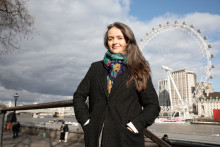Catalina Jaime Sanchez
PhD research topic: Early Warning and Early Action in conflict-affected settings
Work: Head of Climate and Conflict at Red Cross/Red Crescent Climate Centre & PhD researcher at the Faculty of Geo-Information Science and Earth Observation (ITC), University of Twente
Education: Master’s degree in International Humanitarian Action, specialized in disasters, conflict and peacebuilding from Deusto and Uppsala Universities
Originally from: Colombia
‘I’ve always been a humanitarian. It has always been a part of me. I was already involved in the Colombian Red Cross as a child. I grew up in a neighbourhood close to irregular settlements in the mountains, and I’d go there on Saturdays to do social work with the local community. We’d organise vaccination campaigns, teach people to read, work with kids and so on.
Now I work as the Head of Climate and Conflict at Red Cross Climate Centre. In my role, I’m focused on bringing climate action for people who are affected by conflict. We provide the necessary knowledge and support to organisations that work on the ground. We invest a lot of efforts in advancing anticipatory action, meaning early warning systems. Early warning and early action have been a big part of my career. I have always highlighted the need to set up systems that provide better forecasts, early action and allow us to prevent and reduce risks.
Thanks to my role, I was even invited for a visit in Buckingham Palace last year. King Charles was interested in humanitarian implications of climate change, specifically in the effects of the disastrous floods in Pakistan, and I was able to give him a presentation on these topics. He was very interested and asked a lot of questions. It was a great experience.’

‘I come from a very humble Colombian family, but my family has been fascinated by education. My mom had me when she was very young and my parents invested a lot in making sure that we had good education. My cousins and I, we were all able to get a university degree and now we are getting our PhDs. That is just incredible. We are the first generation Masters and PhDs in our family!
And I’ve always wanted to do a PhD! That has been one of my big dreams. I got my Bachelor’s degree in Colombia and was lucky to get a scholarship, which allowed me to get a Master’s degree in Europe. I wanted to continue studying, but I also had to make money and so I started working. I worked on many different humanitarian projects for many years. While I was working in Haiti, I first got in contact with the Climate Centre and met Maarten van Aalst [professor at ITC, e.d.]. I thought the work they were doing was amazing. A few years later, the stars aligned and I got a job with the Climate Centre. Some years later, Maarten got his professorship at ITC and he knew that I was interested in doing a PhD. The stars aligned again and I was able to start my doctoral research.
My research is about early warning and early action in situations of conflict. There are many people in many countries impacted by armed conflict. Their conditions are very different and very vulnerable. They have to deal with disrupted networks and infrastructure, displacement, physical illnesses and injuries, mental strain and so on. At the same time, the likelihood of disasters impacting these communities is increasing due to climate change. I therefore want to know how we can support these communities with early warning systems. I’m trying to understand the interaction of climate and conflict, and pinpoint the gaps of early warning systems in this context. There is currently a research gap when it comes to this topic. There are a lot of papers about hazards but not in connection to conflict impacts.’
‘My PhD research is directly linked to practise. I can pass on my findings immediately, give trainings and directly influence humanitarian actions. I don’t have to wait to publish papers and present my findings at conferences. This opens doors to a lot more impact. My job at Red Cross and my PhD research go hand in hand. It’s very unusual to have this opportunity and I’m very grateful to the Danish Red Cross for supporting my research. It would be impossible to do otherwise.
Time is my main challenge. I wish I had more time to be involved at the UT. I’m based in London and it can be difficult to not be on campus, not having direct access to colleagues. At the same time, I have received a lot of support from the university. I love doing a PhD. I love reading, writing, thinking. I’d do it all the time if I could. But I also have two daughters and a husband, so time is definitely a challenge. I often do my PhD research on Sundays, when my husband takes the kids out to play.
I’m so incredibly grateful to the UT. Doing a PhD this way is probably the only way for me to achieve this goal in life. The fact that the UT invests in people like me is quite special. Doing a PhD when you already have an advanced career opens so many doors. You can shape how you think, how you analyse things, be more effective. Being able to learn about the scientific process and directly apply it – it’s so incredibly impactful.’







